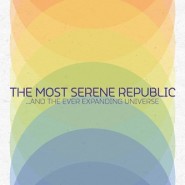 The Most Serene Republic
The Most Serene Republic...And The Ever Expanding Universe
Score: 47
The Most Serene Republic began its career in 2003 with two members, frontman Ryan Lenssen and singer Adrian Jewett. Six years later, it has seven members and has just released its third album under Arts & Crafts, …And the Ever Expanding Universe. The Most Serene Republic has focused over time on their shifting musical presence, and their newest album displays quite a change from their earlier work, as well as a great deal of diversity within the album itself. However, there is a significant amount of fluctuation as to which parts of this change do and don’t work - both benefiting and serving as a detriment to …And the Ever Expanding Universe.
Put simply, the members of The Most Serene Republic are quite talented. The album begins (after the orchestral introduction) with a piano line playing heavy chords, lightened by syncopation. The piano is then joined by powerful guitar chords accompanied by drums, all of which fit perfectly into the creatively irregular line. Later, after an extreme, lengthy crescendo, the track quiets back down to the same piano line, but on the next entrance Adrian Jewett’s voice joins the guitar and drums, moving the track in a completely different direction. The same piano line takes over a third time around the 2:30 mark, this time altered by a higher synth line, and the track transforms in a third, completely unique manner. The band also seems to be able to dig itself out of holes. Even though the tambour of the drums in “Catharsis Boo” is generally hollow and dull, the incredibly interesting drum part more than makes up for the odd sound, to the point where it mixes quite well with the rest of the track.
The largest problem then with …And the Ever Expanding Universe is not located in any specific element of the album but in the intermingling of all the elements. Naturally, it is easy to take issue with certain tracks, such as the excellently titled “No One Likes a Nihilist,” with its incredibly abrupt transitions, “Vessels of a Donor Look” and “Four Humours,” both of which maintain exceptionally bright chords (on a very major album) throughout their entireties, or “All of One Is the Other,” which barely plods along. However, where the album most often suffers is in the amorphous combination of large numbers of voices carrying contrary lines, including most of the louder sections of “Bubble Reputation,” most of “Heavens to Purgatory,” and everything after the four minute mark of the lengthy “Patternicity.” These messier sections diminish the technical prowess of the album to such a great extent that one even begins to wish that the band had made a rule of never combining more than three voices at any one time.
Adrian Jewett and Emma Ditchburn share vocal duties in The Most Serene Republic, and it’s obvious that, throughout …And the Ever Expanding Universe, they’re striving for the right balance and interplay between their two voices. However, they never quite reach that point. Jewett’s solo sections are much better - at his best he displays an intriguing level of nuance, though at his worst he suffers from a severe lack of vocal variation - even in some of his most inflected sections, the pattern of inflection is repeated and quite predictable. Occasionally, one of the two will reach a more interesting level of creativity, such as Jewett’s more interesting work on the opening track, “Bubble Reputation,” but these occasions stand in clear contrast to the rest of the album. Mixing decisions which leave the instrumental cloud much more prominent than any of the vocals compound these issues, leaving the mediocre vocals buried under several layers of sound.
Though many of the lyrics of …And the Ever Expanding Universe are obscured by the muted nature of the vocals, those which break through are generally well-considered and fit rhythmically to the music. Jewett’s surreally intriguing line on “Bubble Reputation”: “Damn you Sol I said to / Quit your knock / On my door with the passing of time,” demonstrates not only the band’s ability to write interesting lyrics but Jewett’s skilled use of enjambment to complement and further develop the irregular rhythm of the track. Later lyrics such as “No One Likes a Nihilist“ ‘s “Quid pro quo fleeting” demonstrate the band’s love for lyrics with extremely fluid meaning. This imbues the component parts of each track with a poetic ambiance but at the same time can leave the tracks somewhat confusing overall.
In the end, …And the Ever Expanding Universe, is an album intricate at its best and messy at its worst. The band certainly knows how to both compose and play interesting, unexpected, and powerful lines, but the band too often relies on density, rather than detail. In The Most Serene Republic’s bio, the band writes of moving towards the “ebbs and flows that make you wanna live.” And while …And the Ever Expanding Universe certainly follows this mindset literally, with upbeat, loud sections paired with much lighter sections, they often, among static slow sections, abrupt transitions, and shapeless denser sections, seem to lose sight of what they claim to be their original purpose for ebbing and flowing: avoiding stagnancy.
This post is tagged 40-49, The Most Serene Republic